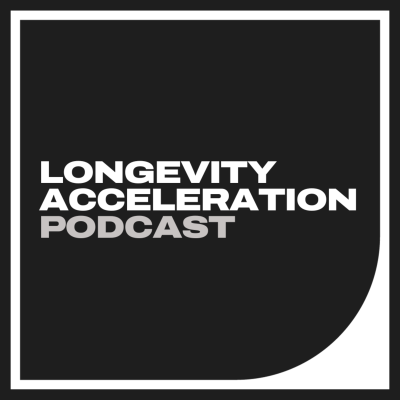
Escuchar Longevity Acceleration Podcast
Podcast de Longevity Biotech Fellowship
Deep dive conversations with visionary leaders in longevity to understand their mental models and roadmaps to solve aging.
Empieza 7 días de prueba
$99.00 / mes después de la prueba.Cancela cuando quieras.
Todos los episodios
6 episodiosIn this 1.5-hour episode of the podcast, we dive deep into the cutting-edge world of longevity research with Peter Fedichev, founder of Gero, and Aleksandr Sviridov. The conversation explores the intersection of physics, biology, and aging, offering fascinating insights into the current state and future potential of longevity science. Key topics discussed include: 1. The application of physics tools to understand aging and the importance of a phenomenological approach 2. Distinguishing between reversible and irreversible aspects of aging 3. Challenges in biological data collection and the shift towards more quantitative approaches 4. The potential of large public datasets and plasma proteomics in drug discovery 5. Establishing a standard model of aging and identifying variables related to maximum human lifespan 6. The limitations of lifespan as a measure of aging and the need for more comprehensive variables 7. Potential interventions including pharmacological, cellular, and gene therapies 8. Alternative approaches such as organ replacement and cryostasis 9. The concept of epigenetic rejuvenation and its challenges Peter and Aleksandr discuss the need for exceptional talent, funding, and collaboration across fields to accelerate progress in longevity research. They emphasize the importance of prevention alongside repair in addressing aging-related damage. The episode provides listeners with a comprehensive overview of the current state of longevity science, highlighting both the challenges and the promising avenues for future research. It underscores the need for a multidisciplinary approach, combining insights from physics, biology, and data science to unlock the secrets of aging and potentially extend human healthspan. For those interested in diving deeper into the field, the speakers recommend following experts like Matt Kaeberlein and Peter Attia for additional insights. This episode offers a thought-provoking exploration of longevity science, suitable for both experts in the field and curious listeners looking to understand the frontier of aging research.
In this episode of the podcast, Co-directors of LBF, Nathan Cheng and Mark Hamalainen, interview Alexander Fedintsev, Chief Science Officer at RLE Group, to explore groundbreaking insights into ageing and longevity. Alexander delves into the intricate role of the extracellular matrix (ECM) and long-lived cells in the ageing process, sharing his journey into the field and his research on geroprotectors and ageing mechanisms. The conversation uncovers the complexity of ageing as an interconnected network, addressing programmed ageing and the challenges of repairing damage in non-dividing cells. Key topics include the impact of ageing on the immune system, the exponential growth of clonal hematopoiesis, and the role of DNA mutations and mitochondria in ageing. Alexander highlights the potential of repairing the ECM for radical longevity, emphasizing the significance of elastin and potential approaches to ECM repair. The discussion also explores the potential of tissue replacement, particularly brain tissue, and the concept of cryopreservation, alongside its challenges and limitations. The episode underscores the need for functional biomarkers of ageing and an engineering mindset in the field. It identifies bottlenecks in ageing research, including the lack of commercial viability and the need for funding and support for bioengineering approaches. The conversation concludes with an optimistic outlook on the rate of progress and the potential for achieving radical life extension in the near future. Links: https://www.researchgate.net/publication/232321881_Isolated_elastin_fibers_of_a_6-year-old_individual [https://www.researchgate.net/publication/232321881_Isolated_elastin_fibers_of_a_6-year-old_individual]- https://www.researchgate.net/publication/232321947_Isolated_elastin_fibers_of_a_90-year-old_individual [https://www.researchgate.net/publication/232321947_Isolated_elastin_fibers_of_a_90-year-old_individual] here are more photos of elastin (different ages and diseases) https://www.sciencedirect.com/science/article/pii/S1568163721000027#fig0015 [https://www.sciencedirect.com/science/article/pii/S1568163721000027#fig0015] here's the paper on HSC transplantation: https://pubmed.ncbi.nlm.nih.gov/37377/ [https://pubmed.ncbi.nlm.nih.gov/37377/]- here's the paper about the extreme longevity of T-cells https://www.nature.com/articles/s41586-022-05626-9 [https://www.nature.com/articles/s41586-022-05626-9]
Jean Hebert is a professor of genetics and neuroscience at the Albert Einstein College of Medicine. In this interview, he discusses his strategy of replacing ageing as a pathway to longevity, shifting focus from genetics to brain tissue replacement due to ageing complexities. He emphasizes the potential of gene delivery technology and brain replacement for longevity. The conversation covers tissue replacement, particularly cortical tissue, and other brain structures like the hypothalamus. Jean addresses surgery challenges, the need for improved techniques, and estimated costs of $3 to $10 billion. We also discuss reversible cryostasis, advancements in cryopreservation, and the ethical implications of brain replacement and destructive uploading, alongside strategies to attract talent and funding to the longevity field.
Reason is co-founder and CEO of Repair Biotechnologies [https://www.repairbiotechnologies.com/]. He has been an active angel investor in the longevity industry since its earliest days, with investments including Oisin Biotechnologies and Leucadia Therapeutics. He is a long-standing and well-connected patient advocate for aging research, involved in numerous fundraising and outreach initiatives conducted by organizations such as the Methuselah Foundation and SENS Research Foundation since the early 2000s. He is also the founder and writer of Fight Aging [https://www.fightaging.org/]!, a noted news and commentary website in the biotechnology community. Prior to his involvement in the biotechnology industry, Reason was a consultant in the software industry. He holds Masters degrees in Astrophysics from the University of St. Andrews and Space Physics from Rice University.
Is there a plan to cure aging? No concrete plan exists on the websites of the National Institute on Aging or any longevity biotech company website. But we need a plan. Solving aging is one of the most challenging and meaningful technological achievements humanity will ever undertake. Mark Hamalainen and Nathan Cheng, the co-directors of the Longevity Biotech Fellowship, introduce an outline for a technical roadmap to solve aging and the accompanying podcast series.
Empieza 7 días de prueba
$99.00 / mes después de la prueba.Cancela cuando quieras.
Podcasts exclusivos
Sin anuncios
Podcast gratuitos
Audiolibros
20 horas / mes























